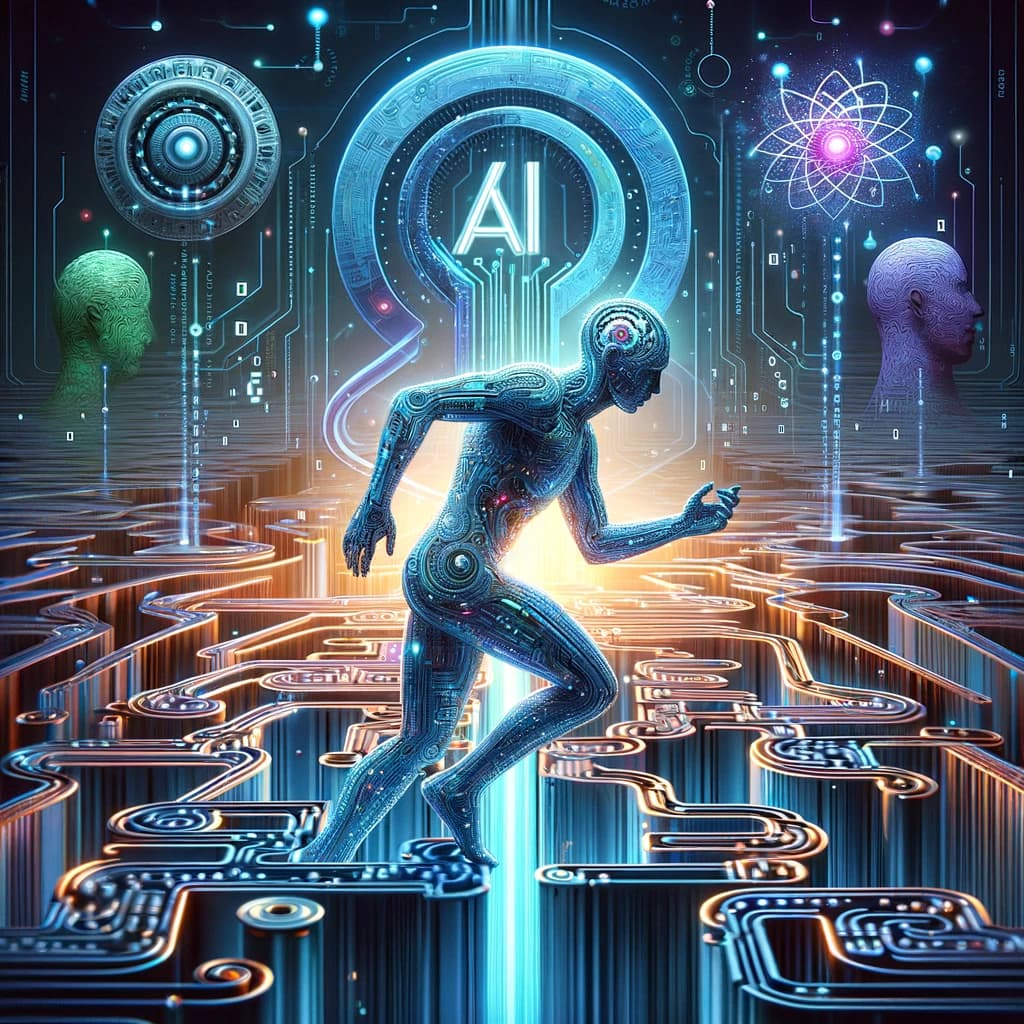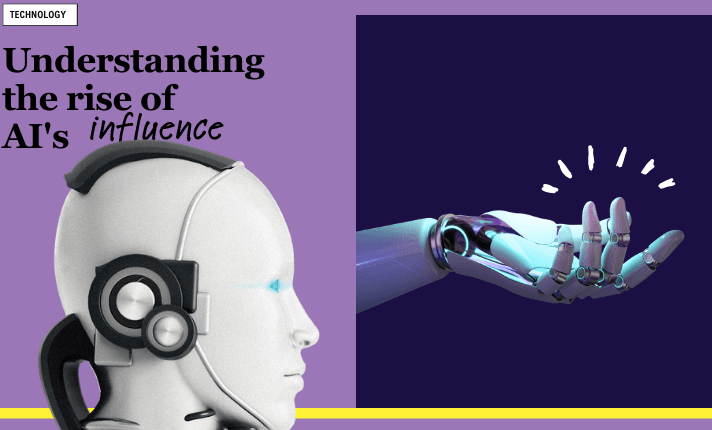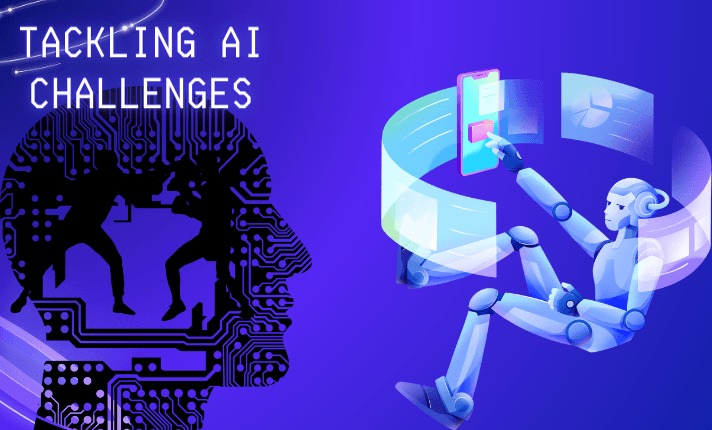
Challenges with AI
Introduction:
In today's rapidly evolving technological landscape, Artificial Intelligence (AI) is a beacon of innovation and a field fraught with challenges. As we delve deeper into machine learning and automation, it's crucial to understand and confront the hurdles accompanying this transformative technology.
"With great power comes great responsibility. As we harness the capabilities of AI, we must remain vigilant in addressing its ethical implications."
Defining AI :
Artificial Intelligence (AI) encompasses the development of computer systems capable of performing tasks that typically require human intelligence. This includes learning from experience, reasoning, and adapting to new situations. AI utilizes techniques such as machine learning, natural language processing, and computer vision to simulate human-like cognitive functions. From virtual assistants to self-driving cars, AI powers many applications that continue to reshape industries and redefine the boundaries of technological innovation.
Evolution of AI: From Concept to Reality
The evolution of AI spans decades, from early concepts to modern breakthroughs. Initially, AI focused on rule-based systems and symbolic reasoning. With advancements in computing power and data availability, machine learning emerged, allowing systems to learn from data. Today, AI encompasses deep learning, neural networks, and reinforcement learning, enabling complex tasks like natural language processing and image recognition. This evolution reflects a journey of innovation and collaboration across multiple disciplines.

Scope and impact of AI in various sectors :
AI's scope spans across sectors, revolutionizing industries like healthcare, finance, and transportation. In healthcare, AI aids in diagnosis and drug discovery. In finance, it optimizes trading algorithms and fraud detection. In transportation, it powers autonomous vehicles. AI's impact extends far, enhancing efficiency, decision-making, and customer experiences across diverse sectors.
Challenges on the Horizon :
1. Ethical Dilemmas in AI Development:
Balancing Progress with Responsibility
Ensuring Fairness and Equity in Algorithms
Ethical dilemmas in AI development arise from the tension between technological advancement and ethical responsibility. Balancing progress with responsibility entails grappling with issues like data privacy, algorithmic bias, and job displacement. Ensuring fairness and equity in algorithms demands transparency and accountability in AI systems. Without proper oversight, algorithms can perpetuate biases and discriminate against marginalized groups. Striking a balance requires a multifaceted approach, incorporating ethical frameworks, diverse perspectives in development teams, and continuous evaluation of AI systems' impact on society to foster a more equitable and just technological landscape.
Economic Challenges with AI | Solutions |
|---|---|
Income Inequality | Redistribution |
Disruption of Traditional Industries | Adaptation |
Skill Mismatch in Labor Force | Reskilling |
Market Monopolization | Regulation |
Unemployment | Diversification |
2. Data Privacy and Security Concerns :
"AI is not a science-fiction technology; it is already a reality, and it's transforming our world in profound ways." - Sundar Pichai, CEO of Google
Protecting Sensitive Information in the Age of AI
Safeguarding Against Data Breaches and Misuse
AI presents formidable challenges in data privacy and security, necessitating robust safeguards. Protecting sensitive information involves encryption, anonymization, and strict access controls to mitigate the risk of unauthorized access or data breaches. Safeguarding against misuse requires stringent compliance with data protection regulations and ethical guidelines. The proliferation of AI amplifies concerns about data privacy, as algorithms increasingly rely on vast datasets. As custodians of personal information, organizations must prioritize transparency and accountability in their AI initiatives, fostering trust among users while navigating the intricate landscape of privacy and security in the digital age.
Moral Challenges with AI | Solutions |
|---|---|
Autonomous Weapons | Regulation |
Algorithmic Bias | Fairness |
Privacy Invasion | Transparency |
Ethical Decision-Making | Accountability |
3. Algorithm Bias and Discrimination
Unraveling the Complexities of Bias in AI Systems
Strategies for Mitigating Bias and Promoting Diversity
AI challenges regarding algorithm bias and discrimination demand scrutiny and proactive measures. Unraveling the complexities involves identifying sources of bias, whether in training data or algorithm design. Strategies for mitigation include diversifying datasets, implementing fairness-aware algorithms, and fostering inclusive development teams. By addressing bias head-on, AI practitioners can cultivate more equitable systems, advancing towards a future where technology reflects and respects the diversity of the societies it serves.
Social Challenges for AI | Solutions |
|---|---|
Privacy Concerns | Implementation of strict data protection measures |
Bias Discrimination | Regular audit of AI systems |
Jobs Displacement | Encourage policies fostering new job opportunities synergizing with AI, rather than displacing human labor. |
Facts and Figures :
According to a report by Statista, the global AI market is projected to reach $733.7 billion by 2027.
A survey conducted by Deloitte found that 32% of organizations cite AI ethics and transparency as their top AI-related challenge.
Tackling AI Challenges: Strategies and Solutions:

1.Ethical Frameworks and Guidelines
Implementing Ethical AI Principles and Standards
Collaborating Across Industries to Promote Ethical Practices
Tackling AI challenges requires the implementation of robust ethical frameworks and guidelines. This involves incorporating ethical AI principles and standards into development processes. Collaboration across industries is essential to promote ethical practices, facilitating knowledge-sharing and collective problem-solving. By establishing clear guidelines and fostering collaboration, we can ensure that AI technologies are developed and deployed responsibly, benefiting society while minimizing potential harms and ethical dilemmas.
2. Robust Data Governance Policies
Establishing Clear Data Ownership and Usage Guidelines
Investing in Data Encryption and Secure Storage Solutions
Addressing AI issues necessitates robust data governance policies. This entails establishing clear data ownership and usage guidelines to ensure accountability and transparency. Investing in data encryption and secure storage solutions is paramount to safeguarding sensitive information from unauthorized access or breaches. By prioritizing data security and governance, organizations can mitigate risks associated with AI implementation and foster trust among stakeholders in an increasingly data-driven landscape.
3. Diverse and Inclusive AI Development Teams
Embracing Diversity to Challenge Biases in AI Development
Fostering an Inclusive Culture of Innovation and Collaboration
Tackling AI challenges involves cultivating diverse and inclusive AI development teams. Embracing diversity is key to challenging biases inherent in AI development, as diverse perspectives lead to more equitable and robust solutions. Fostering an inclusive culture of innovation and collaboration encourages the exchange of ideas and promotes creativity. By embracing diversity and inclusivity, organizations can ensure that AI technologies are developed with sensitivity to the needs and experiences of diverse populations, ultimately leading to more equitable outcomes.
Conclusion:
As we navigate the complex terrain of Artificial Intelligence, it's imperative to confront the challenges head-on with vigilance, innovation, and ethical integrity. By fostering collaboration, embracing diversity, and prioritizing ethical considerations, we can harness the full potential of AI while mitigating its risks. Together, let's shape a future where AI serves as a force for good, empowering humanity and driving positive change across the globe.